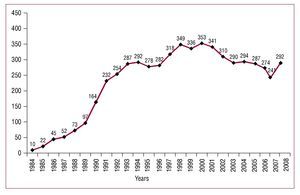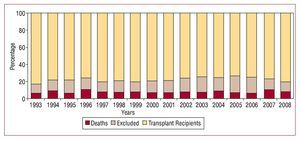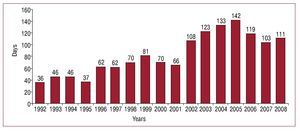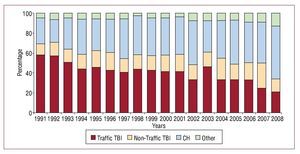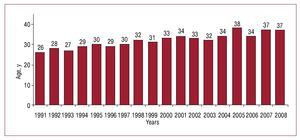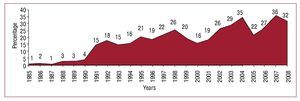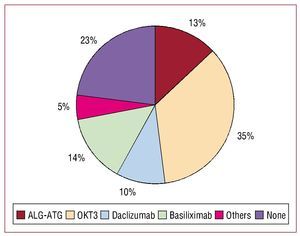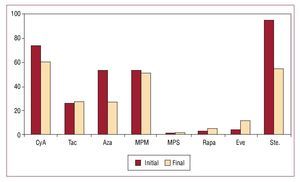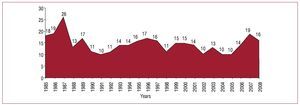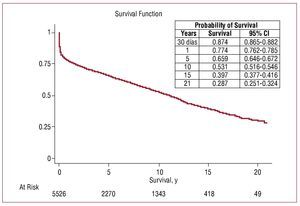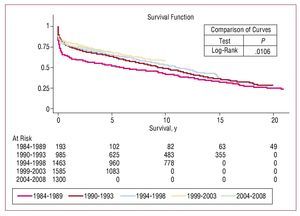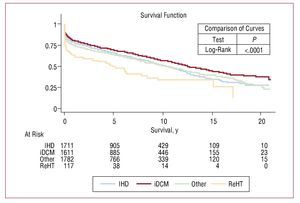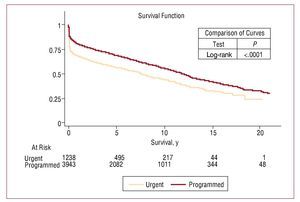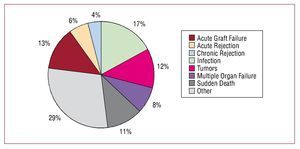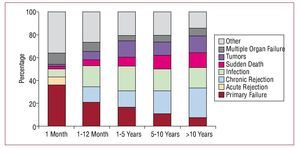Keywords
INTRODUCTION
This article is the customary annual update analysis describing results of heart transplantation activity conducted in Spain between the first such procedure, performed in May 1984, and December 31, 2008.1-19
The registry includes all heart transplants performed by all teams at all centers in Spain and is therefore an accurate account of the status of heart transplantation in the country. The report's reliability is founded on the nationwide use of a similar database constructed on mutually agreed principles, which standardizes variables and unifies possible responses.
METHODS
Patients and Centers
Nineteen heart transplantation centers supply the registry with data (Table 1), although only 18 are currently active.
In the 24 years that heart transplantation procedures have been performed in Spain, the total number of operations has reached 5774. Figure 1 presents the distribution of the number of heart transplants per year. Of these, 94% were isolated orthotopic transplants. Table 2 shows the distribution of transplants by procedure type.
Figure 1. Number of heart transplants per year. Spanish Registry on Heart Transplantation 1984-2008.
Design
The database includes 175 clinical variables with data on recipients, donors, surgery, immunosuppression, and follow-up. Each year, the centers send data to the person responsible for the registry, who organizes the statistical methodology with the company contracted to perform the analysis. The same person is responsible for organizing the audit of the centers to check the data.
In 2008, the Registry was submitted to and received the approval of the Committee for Biomedical Research Ethics of the Hospital Universitario La Fe, Valencia. We are in the process of submitting the Registry to the Spanish Ministry of Health and Consumer Affairs to guarantee fulfillment of Spanish Data Protection Law 15/1999.
Statistical Analysis
Variables are presented as mean (SD). Data on survival are analyzed in Kaplan-Meier curves and compared using the log rank test. A P value less than .05 was considered significant.
RESULTS
Heart Transplant Recipient Profile
In Spain, the profile of the average heart transplant recipient is that of a 53-year-old man diagnosed with ischemic heart disease or idiopathic dilated cardiomyopathy and with blood group A or O. Table 3 shows the clinical profile of isolated heart transplant recipients by age-group; retransplantation recipients appear in a separate column.
Waiting List Mortality and Days to Transplant
In 2008, waiting list mortality was 8%. The percentage of patients excluded from transplant after inclusion on the waiting list was 12%. Figure 2 shows the annual percentage of waiting list patients who received a transplant, were removed from the list without receiving one, or died before receiving one.
Figure 2. Patient outcomes following inclusion on the heart transplantation waiting list. Spanish Registry on Heart Transplantation 1984-2008.
Mean waiting list time for recipients prior to undergoing a heart transplant in 2008 was 111 days. Figure 3 shows how this has evolved over the last 17 years.
Figure 3. Year-on-year evolution of mean waiting list to heart transplantation days. Spanish Registry on Heart Transplantation 1984-2008.
Cause of Death and Mean Donor Age
Most heart transplant donors die of cerebral hemorrhage. Mean donor age in 2008 was 37 years (Figures 4 and 5).
Figure 4. Year-on-year evolution of causes of heart transplant donor deaths. Spanish Registry on Heart Transplantation 1984-2008. CH indicates cerebral hemorrhage; TBI, traumatic brain injury.
Figure 5.Year-on-year evolution of mean age of heart transplant donors. Spanish Registry on Heart Transplantation 1984-2008.
Urgent Transplantation
The rate of indications for urgent transplantation in 2008 was 32%. Figure 6 shows the evolution of indications for urgent heart transplant over the years.
Figure 6.Year-on-year evolution of urgent heart transplantations. Spanish Registry on Heart Transplantation 1984-2008.
Immunosupression
In Spain, most heart transplant recipients receive induced immunosuppression treatment (77%). The drugs used appear in Figure 7.
Figure 7. Induced immunosuppression. Drugs administered. Spanish Registry on Heart Transplantation 1984-2008.
Maintenance immunosuppression treatment administered and changes made during transplant patients' clinical course are shown in Figure 8.
Figure 8. Maintenance immunosuppression. Variations in clinical course by drug type. Immunosuppression at transplantation and at end of follow-up. Spanish Registry on Heart Transplantation 1984-2008. Aza indicates azathioprine; CyA, cyclosporine A; Eve, everolimus; MPM, mycophenolate mofetil; MPS, mycophenolate sodium; Rapa, rapamycin; Ste, steroids; Tac, tacrolimus.
Early mortality (death at £30 days post-transplantation) was 16% in 2008 (Figure 9). When survival rate data for 2008 were added to those of previous years, we obtained 87% 1-month actuarial survival, and 1-, 5-, 10-, and 15-year rates of 77%, 66%, 53%, and 40%, respectively (Figure 10). Survival by periods showed better results in the last stage with 1- and 5-year survival rates of 80% and 70%, respectively, and significant differences between periods (Figure 11).
Figure 9. Year-on-year percentage evolution of early deaths (at ≤30 days). Spanish Registry on Heart Transplantation 1984-2008.
Figure 10.Actuarial survival curve (Kaplan-Meier) for the entire series. Spanish Registry on Heart Transplantation 1984-2008.
Figure 11. Survival curve by periods. Spanish Registry on Heart Transplantation 1984-2008.
Survival curves differed according to the etiology indicating heart transplantation (Figure 12). Degree of urgency influenced probability of survival (Figure 13).
Figure 12. Survival curves according to etiology indicating transplantation. Spanish Registry on Heart Transplantation 1984-2008. iDCM indicates idiopathic dilated cardiomyopathy; IHD, ischemic heart disease; ReHT, retransplantation.
Figure 13. Survival curves by degree of urgency. Spanish Registry on Heart Transplantation 1984-2008.
Survival
Causes of Death
The most frequent cause of death in the entire series was infection (17%), followed by combined graft vascular disease and sudden death (15%), acute graft failure (13%), tumors (12%), and acute rejection (6%) (Figure 14).
Figure 14. Causes of death. Spanish Registry on Heart Transplantation 1984-2008.
When causes of mortality are analyzed by periods, differences can be seen at £30 days (acute graft failure), 1-12 months (infections), and >1 year (tumors, the combination of sudden death with chronic rejection and infection) (Figure 15).
Figure 15. Causes of death by periods. Spanish Registry on Heart Transplantation 1984-2008.
DISCUSSION
With 24 years' experience of heart transplant in Spain, and nearly 5800 transplants performed, we would say that this procedure can be offered to the whole population with the certainty that levels of knowledge, control and survival are similar to or better than those of other countries in western Europe and around the world. Analysis of the Registry of the International Society for Heart and Lung Transplantation annual report demonstrates this.20-24
An important advantage of our Registry is that it is compiled from a standardized database that only permits a previously agreed range of responses. All teams update results annually and submit figures to the Registry Director who collates the data and sends them to an independent statistics consultancy for analysis. We believe this method greatly enhances the reliability of our results and avoids errors of the kind so often found in nonstandardized databases. In 2007, we increased the number of variables analyzed for each patient to 175. In 2008, the Registry received the approval of the Biomedical Research Ethics Committee of the Hospital Universitario La Fe, Valencia. In the near future, it will be submitted to the Spanish Ministry of Health and Consumer Affairs to give it legal coverage and ensure adequate protection of patient healthcare data. Furthermore, to attain improved quality and greater data reliability, we intend to continue with the audit of centers by independent external companies that guarantee maximum data validity.
Currently, the number of active transplantation centers is 18 (the most recent incorporation was the Hospital Vall d'Hebron, Barcelona, in 2006). The fact that, in Spain, centers are authorized to conduct transplants without adequate needs analysis is of great concern to the transplant teams. This is due to the fact that the number of optimal donors has shown a clear tendency to fall whereas the ratio between the number of centers and the number of transplants has increased. The fact that fewer transplant procedures are being performed leads to the under use of resources in hospitals equipped to conduct a great number of transplants, and to a longer learning process needed to achieve adequate results. The only tangible benefit for patients is the convenience of being able to undergo transplantation without having to travel far from home.
In 2008, contrary to expectations, the number of transplants performed rose (292 in 2008 vs 241 in 2007). This improved the current situation of the waiting list as, since 2000 when 353 transplants were performed, there has been a gradual fall in the number of transplants. There is no single explanation for the reduction in the number of donors since 2000, but it seems clear that incidence of death from traumatic brain injury has decreased while care of patients with multiple trauma in specialized units has improved. The increase in 2008 may be related to the greater use of organs donated by patients with cerebral hemorrhage.
The general scarcity of donors in relation to the number of patients in need of a transplant has caused an increase in days waiting to obtain an organ (111 in 2008 vs 103 in 2007). In 2008, death while on the waiting list was 8%; however, we should add those patients removed from the list due to severe decompensations and not included again because they die after their removal from the list. According to Spain's national transplant organization, these account for some 6% of deaths in 2008.25 Consequently, in 2008 mortality among patients with advanced heart failure and waiting for a heart was 14%.
The clinical profile of patients has not changed in recent years. We analyzed heart transplant recipients in 3 groups (pediatric, adult, and retransplantation) as each of these is indicated for transplant for very different clinical causes: pediatric patients are operated for congenital heart disease or idiopathic dilated cardiomyopathy; they have higher pulmonary resistances and present no cardiovascular risk factors. In contrast, patients undergoing retransplantation are usually indicated for graft vascular disease; they present greater organ deterioration and more risk factors. This may be a more accurate explanation for the bad prognosis of these patients than the fact that they undergo a second transplant.
Urgent heart transplantation is somewhat controversial as these operations have specific characteristics (recipients in worse clinical condition, less-than-ideal donors, longer periods of ischemia) that entail a worse prognosis than programmed transplants. In 2008, the percentage of urgent transplants fell slightly (32% in 2008 vs 36% in 2007). However, the trend of recent years has been upward. The percentage of patients undergoing urgent transplantation varies from one geographical area to another and alters substantially from one year to the next. The cause of these fluctuations in indication for urgent heart transplantation is not wholly clear; nor are the differences in geographical distribution although the low number of donors clearly increases the opportunities for urgent transplantation. Indication for urgent transplantation has been questioned, given that it offers clearly poorer results. However, the transplant teams are of the opinion that this option should continue to exist, although in a controlled form. To ensure optimal chances of survival for critical patients undergoing transplantation we should bear in mind, as European guidelines on heart failure recommend, that it is better to stabilize heart failure rather than indicate for urgent transplantation and heart transplant should not be considered a treatment for unstable acute heart failure26 (among other things, because of the time taken in locating a donor even in cases as urgent as these).
Most transplant teams use induced immunosuppression (77%). Since transplants were first practiced, the most frequent treatment has been with OKT3 although currently interleukin 2 antagonists are more commonly used (75% of transplants performed in the last 5 years). The maintenance immunosuppressor treatment most frequently used is that known as the triple combination: cyclosporine versus tacrolimus, azathioprine versus mycophenolate mofetil, and steroids. However, depending on patient clinical course, the introduction of other immunosuppressors such as rapamycin, everolimus, mycophenolate acid and, more recently, extended-release tacrolimus, is common.
Incidence of early mortality fell in 2008 with (16% in 2008 vs 19% in 2007). This may be related to the lower number of emergency cases and our better preparation to offer adequate post-transplantation management of critical patients as ventricular care devices are available in virtually all transplantation centers. The early period is probably the most important in improving survival, as the survival curve stabilizes after the first months post-transplantation.
Over the years, overall survival has shown a clear trend towards progressive improvement. However, logically, the number of patients added to the Registry each year represents a comparatively smaller percentage of the total. Thus, the probability of substantial changes arising in any one year are very remote and analysis of survival by periods is more illuminating. In recent years, survival has improved significantly by comparison with earlier periods.
Indication for transplantation is clearly linked to survival. Patients diagnosed with idiopathic dilated cardiomyopathy have a higher survival rate than other heart transplant recipients because they are younger and present fewer cardiovascular risk factors.
The most frequent cause of death in the entire series is infection (17%) followed by the combination of chronic rejection and sudden death (15%), acute graft failure (13%), tumors (12%) and acute rejection (6%). However, cause of death is usually related to time post-transplantation. Thus, during the first month, the most frequent cause is acute graft failure; at 1-12 months, infection; and then the combination of sudden death with chronic rejection, infections, and tumors. It is important to note that, especially in recent years, infection seems to be gaining ground as a cause of death, whereas death due to acute rejection is less frequent. This imbalance could be due to the over-administration of immunosuppressor drugs that prevent rejection but favor infection.
CONCLUSIONS
In general, early and late survival rate figures are similar to those published in international registry reports and have improved year on year, especially in the last 5 years.
We should continue to try to reduce the high incidence of acute graft failure as this would have a particularly good effect on the probability of immediate post-operative and overall survival.
Given that infection is a greater cause of morbidity and mortality than rejection, we should pay it more attention and place it among the principle objectives of general studies and of clinical trials of drugs.
Statistical analysis conducted with unconditional financial support from Novartis Trasplante.
Correspondence: Dr. L. Almenar-Bonet.
Avda Primado Reig, 189-37. 46020. Valencia. España.
E-mail: lu.almenarb5@comv.es
Received June 11, 2008.
Accepted for publication July 8, 2008.
